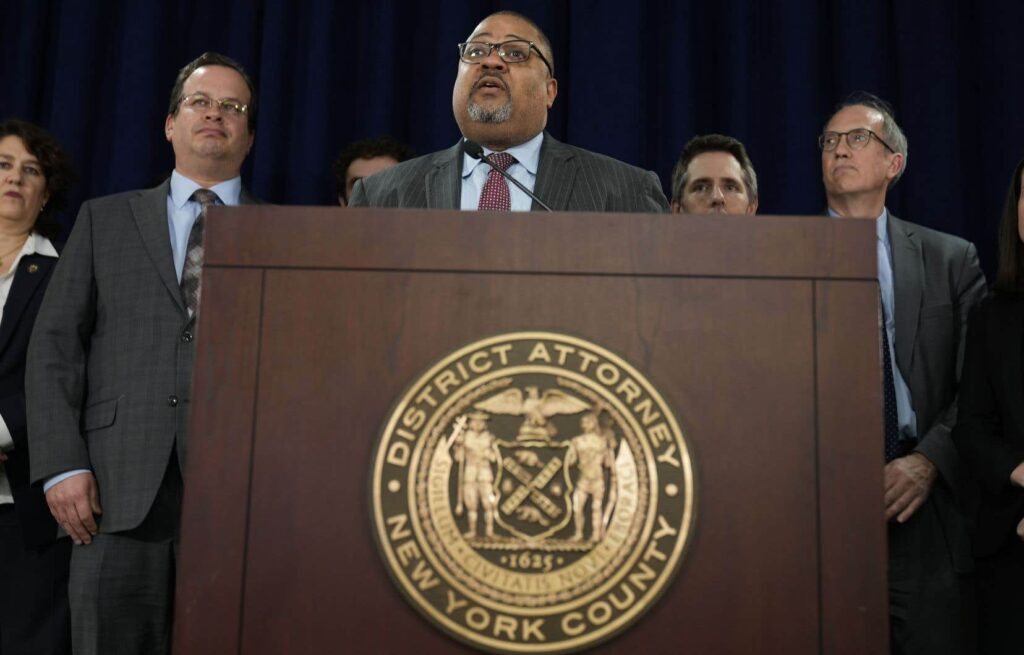History will remember that the New York prosecutor succeeded where his colleagues failed: to convict Donald Trump criminally. Certainly less glamorous than electoral interference or the retention of classified documents, this file risks being the only one judged before the presidential election.
The prosecutor who instructed him, Alvin Bragg, 50, had a modest triumph Thursday evening after the verdict. “I did my job. We did our job,” he soberly commented.
“The only voice that counts is that of the jury, and the jury has spoken,” declared Alvin Bragg, noting the unanimous decision of the twelve jurors to find Donald Trump “guilty of 34 counts of aggravated accounting falsification to conceal a conspiracy aimed at perverting the 2016 election.”
Judge Juan Merchan set sentencing for July 11.
An indisputable revenge for the man who in April 2023 became the first prosecutor to criminally prosecute a former American president. At the time, most legal commentators pointed to legally flawed proceedings and venial accusations compared to other investigations targeting Donald Trump and many of them did not give up.
“A year ago, most people like me would have said that this was the case least likely to come to trial, that it was probably the least important,” the former federal prosecutor Randall Eliason, professor of criminal law at George Washington University.
Especially since Alvin Bragg displays neither the solemn austerity of special prosecutor Jack Smith nor the sense of biting repartee of prosecutor Fani Willis.
The first is investigating federal proceedings against the former Republican president for illicit attempts to reverse the results of the 2020 election and for withholding classified documents after his departure from the White House. The second leads the charge against him and 14 others in the key state of Georgia (southeast) for related acts of electoral interference in 2020.
“Simpler file”
Prosecutions significantly more serious than in the New York case, since Donald Trump was then no longer a simple candidate, but either an outgoing president or a former president.
But this is precisely what delayed a trial in the other three cases, explains Randall Eliason.
“The others raise more complicated questions about his indictment for what he did while he was president, or after,” he says.
“In this respect, it was a much simpler file, which allowed it to move forward more quickly, since it did not involve many difficult constitutional questions,” adds the expert.
“It’s not so much that this one moved quickly, but that the other three got bogged down for different reasons,” he concludes.
Through appeals, the lawyers of the Republican candidate in the November 5 election against his Democratic successor, Joe Biden, managed to postpone the other three trials indefinitely.
“The most important trial would be the one concerning electoral interference” at the federal level, underlines electoral law specialist Richard Hasen on his blog, describing the procedure in New York as a “relatively minor case”.
“And this trial has very little chance of being held before the election as long as the Supreme Court drags on ruling on his appeal for immunity,” he laments.
This procedure is suspended until the Supreme Court with a conservative majority rules on the criminal immunity invoked by Donald Trump as ex-president.
The country’s highest court is not expected to decide before June, or even July. The nine judges appeared in April to be impervious to arguments in favor of absolute criminal immunity for a former president, but the date as well as the wording of their decision could definitively compromise the holding of the trial before the election.
If he were elected again, Donald Trump could, once inaugurated in January 2025, order the abandonment of federal proceedings against him.

